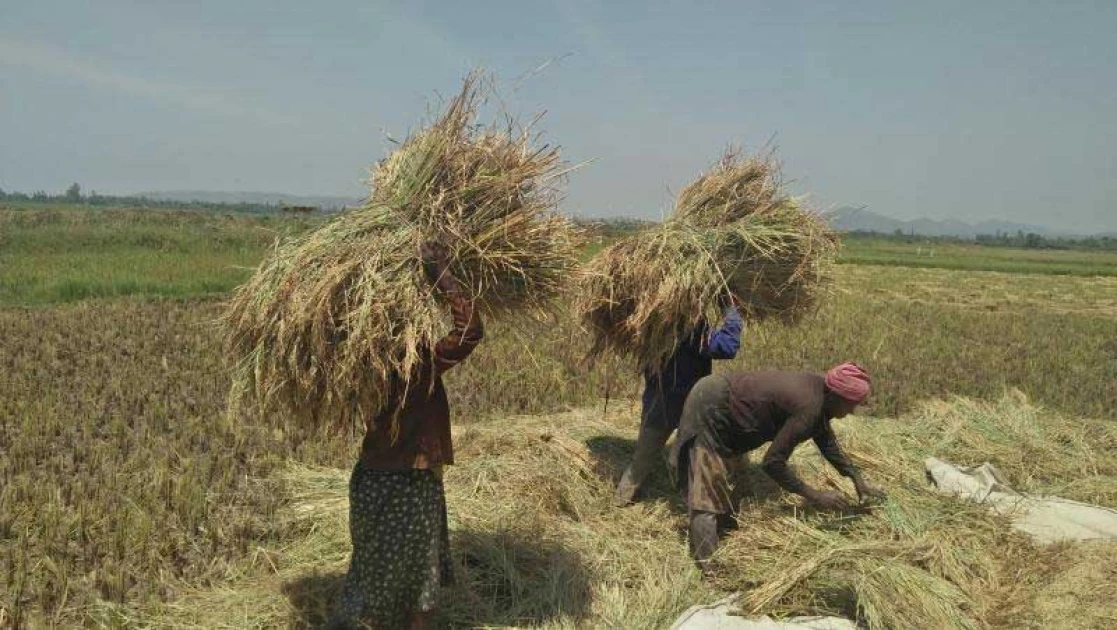Rice farmers left high and dry as state opens duty free importation window

Rice farmers tend to crop at the Mwea Irrigation scheme in Kirinyaga County. Photo| File

Audio By Carbonatix
The farmers alleged that some unscrupulous traders were branding the imported rice to look like Mwea rice, hence hurting their produce.
It did not take long before Bruno Linyiru, the Director General of the Agriculture and Food Authority (AFA) of Kenya, visited Mwea and assured the over 8,500 farmers that all the rice available in their stores will all be bought by KNTC, and payment processed promptly.
The DG of AFA went on to say, “As the regulator, we have also noticed concerns raised by the society and we also know this could be true, that there are a few unscrupulous traders who could be packaging imported rice to make it look like the Basmati rice or the Pishori rice that we have in Mwea. We will be cracking down on this.” he noted.
Linyiru revealed that Kenya produces 191,000 metric tons of milled rice annually, a level of production that can only last for maximum two months. Kenya has a demand monthly average of 100,000 metric tons.
The DG said that since January, 94,000 metric tons of Rice has been imported, hence the need to increase local production to reduce reliance on imports to supplement the gap.
A duty-free betrayal to farmers
In a change of tune, the government, through a gazette notice on July 17, notified the general public that, “Pursuant to section 114 (2) of the East African Community Customs Management Act 2004 as read with item 20 of Part B of the fifth schedule of the act, the Cabinet Secretary for the National Treasury and Economic Planning upon recommendation by the Cabinet Secretary for Agriculture and Livestock Development, directs that 500,000 metric tons of Grade 1 milled White rice be imported into Kenya duty-free on or before 31st December 2025.”
With a stroke of the pen, all the promises given to farmers by top government officials have fallen flat on the face. It is a fact that Kenya is insufficient in rice production and needs to import to fill in the gap but to allow a window of duty free rice importation is a double blow to the hard working rice farmers in the country and a ticket to their continued misery.
The puzzling annual action of government in which it opens up duty free windows for the importation of basic consumption commodities seems to be still in vogue.
Last year, Treasury opened a six-month window for the importation of 500,000 tons of milled rice to cover a shortage of the commodity.
The government allowed import traders to import milled grade one rice duty-free until 30th November 2024 to supplement local production and ease pressure on prices of the staple food.
In March 2023, the government of Kenya opened a window of duty-free importation of 500,000 tons of white duty-free maize and 500,000 tons of rice to cushion consumers against the high cost of the staples due to acute shortage. In the gazette notice dated March 17, then Treasury CS Njuguna Ndung’u announced that the window would last from March 17 2023 to 6th August 6, 2023.
This in a country where windows for duty-free import of food are opened and shut arbitrarily, it has become a cartel’s paradise.
Whichever interest group happens to command influence political power and influence over the power brokers in government at any given time hold the keys to these lucrative opportunities to mint millions before disappearing like it never happened.
Threat to food sovereignty
Kenya, in light of such continues in the same self-defeatist lane it took many years back. The country can boast of many accolades but it cannot boast of food sovereignty. Kenya’s dependency ratio on its food balance sheets is austounding. And not all of these imports are legal, or safe to eat as was witnessed with the scandalous cooking oil imports of the year 2023 which have been pushed under the carpet.
Reports from research bodies such as ENACT have shown that the illicit trade in substandard foodstuffs is controlled by criminal cartels that start from Kenya with tentacles in Uganda, Tanzania, and Somalia.
Many genuine traders follow Kenya’s import regulations; but these are overshadowed by criminals posing as traders who bring into the country food products such as sugar, maize, rice, milk powder, vegetables and pulses full of mercury, lead and other insoluble matters unfit for human consumption into the country and exposing many people’s lives to danger.
Besides the problem of Kenyans being exposed to consuming substandard or toxic food, the livelihood of many smallholder farmers who daily have contend with high costs related to food production is also at risk.
Mwea rice farmers are currently in the planting season without the subsidized fertilizer the government has been touting will bring low the cost of inputs in farming. Fertilizer in Kenya could possibly be the most expensive in the world.
Seeds and production equipment are also costly. These factors have led to local farmers complaining about a lack of government protection from the competition from food imports smuggled into the country.
Farming in Kenya remains a high risk venture where one cannot be certain they will make back what they put in and as well expect a profit unless the government turns around to ensure the issue of food security is not only paid lip service but is a treated as a matter of national importance.


Leave a Comment